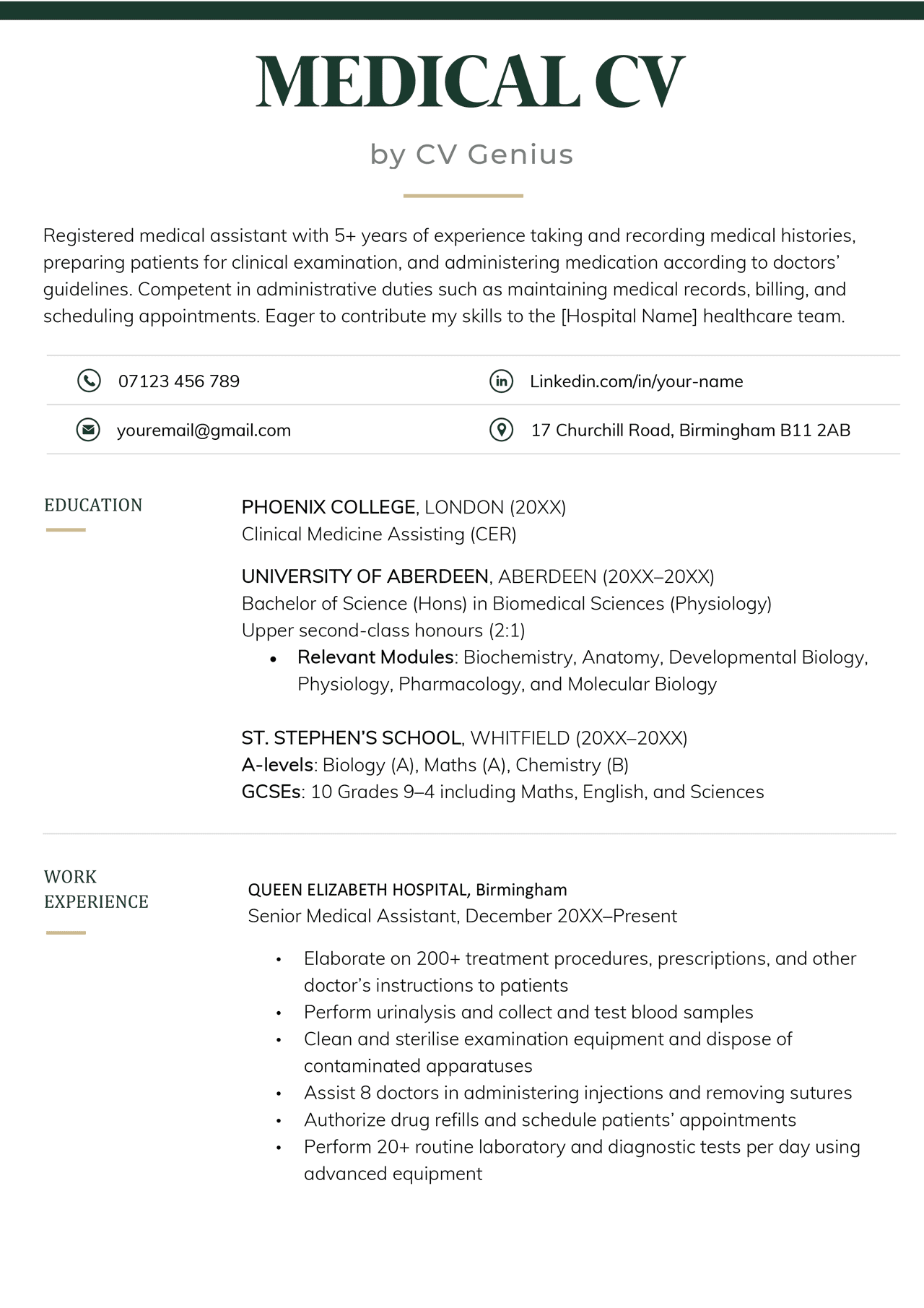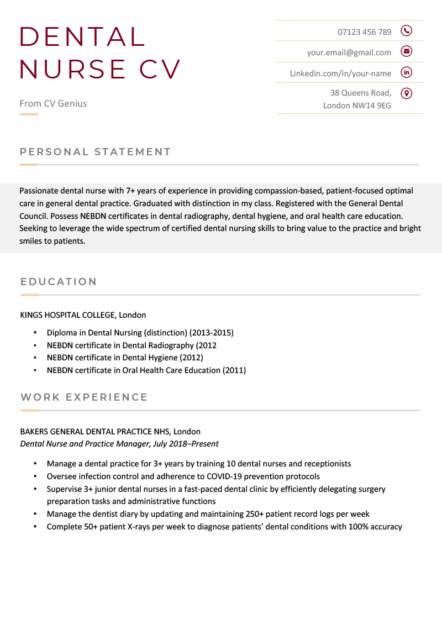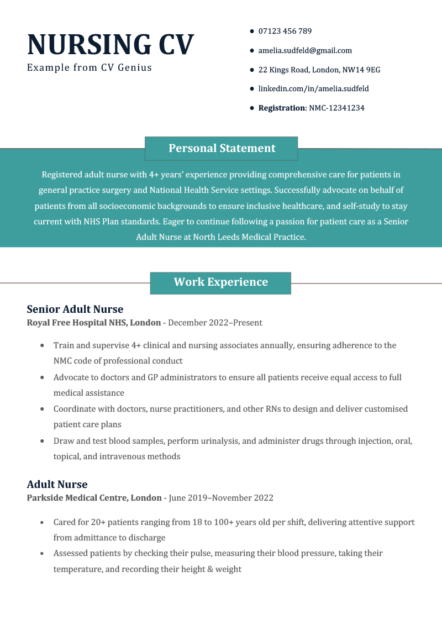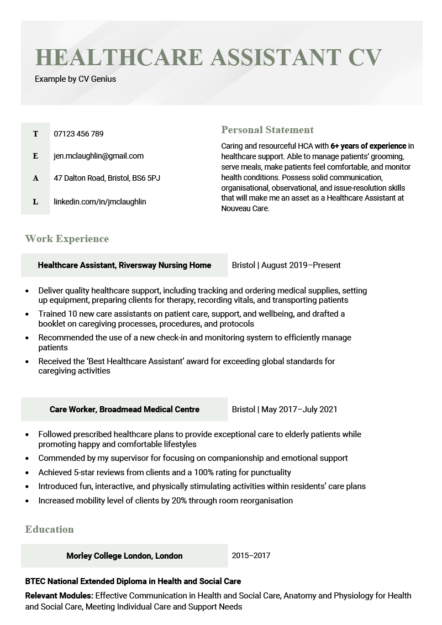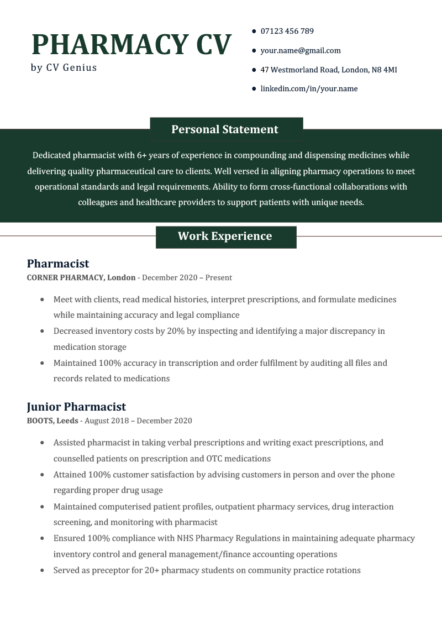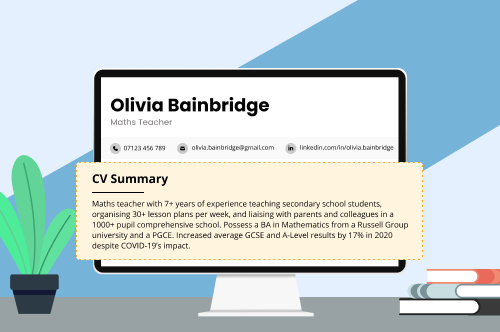Ensure your CV layout is structured to best highlight your unique experience and life situation.
Medical CV Template (Text Format)
PERSONAL STATEMENT
Registered medical assistant with 5+ years of experience taking and recording medical histories, preparing patients for clinical examination, and administering medication according to doctors’ guidelines. Competent in administrative duties such as maintaining medical records, billing, and scheduling appointments. Eager to contribute my skills to the [Hospital Name] healthcare team.
WORK EXPERIENCE
Queen Elizabeth Hospital, Birmingham
Senior Medical Assistant, December 2018–Present
- Elaborate on 200+ treatment procedures, prescriptions, and other doctor’s instructions to patients
- Perform urinalysis and collect and test blood samples
- Clean and sterilise examination equipment and dispose of contaminated apparatuses
- Assist 8 doctors in administering injections and removing sutures
- Authorise repeat prescriptions and schedule patients’ appointments
- Enlighten patients about the benefits of COVID-19 vaccinations
- Perform 20+ routine laboratory and diagnostic tests per day using advanced equipment
Birmingham Heartlands Hospital, Birmingham
Medical Assistant, May 2017–November 2018
- Recorded medical histories and basic measurements such as height, blood pressure, temperature, and weight
- Collected blood and laboratory samples and logged them for testing
- Prepared 15 examination rooms and kept them tidy
- Contacted 4 medical departments for patient testing and admission
- Performed administrative tasks such as greeting and logging in patients
EDUCATION
Phoenix College, London (2016)
Clinical Medicine Assisting (CER)
University of Aberdeen, Aberdeen (2011–2015)
Bachelor of Science (Hons) in Biomedical Sciences (Physiology)
- Upper second-class honours (2:1)
- Relevant Modules: Biochemistry, Anatomy, Developmental Biology, Physiology, Pharmacology, and Molecular Biology
Stephen’s School, Whitfield (2004–2011)
- A-levels: Biology (A), Maths (A), Chemistry (B)
- GCSEs: 10 A-C including Maths, English, Sciences, and IT
KEY SKILLS
- Skilled with medical equipment and software, such as X-rays and telehealth devices
- Exceptional organisational skills
- Excellent interpersonal skills
- Proven customer service skills
- Proficient in MS Office Suite, Outlook, and Access
HOBBIES & INTERESTS
- Reading non-fiction
- Contributing on medical blogs
- Singing
- Playing chess
How to write a medical CV
Before you begin writing, make sure you know how to write a CV in a way that best emphasises your strengths.
When applying for a role in the healthcare field, you’ll want a medical CV that showcases your strengths. You want your new employer to see you’ve got the knowledge and practical skills to fill the role, as well as a personality that’ll put your patients at ease.
When applying for medical jobs, be sure to choose a simple CV template that reflects your professionalism.
Here are three tips to help you write a professional medical CV:
1. Highlight your medical CV skills
Employers look for medical skills focusing on your medical-related hard and soft skills.
Hard skills, or technical skills, are the skills learnt through training. Emphasising hard skills on your medical CV helps put your medical knowledge at the forefront for medical recruiters to see.
These hard skills are some that you might include in your CV’s work experience section:
- Healthcare administration
- Coordinating medical facility services
- Medical instruction material creation
- Ability to operate diagnostic instruments and medical equipment
- Ability to research optimal solutions for health and medical issues and their prevention
Soft skills highlight your medical work ethic and how you relate to other people. For instance, interpersonal skills are important in the medical industry as they help you bring about positive change and maintain a pleasant vibe in your hospital or GP’s surgery.
Employers will look at the soft skills of all their applicants, and ask: Does this medical applicant convey professionalism? Will their attitude fit the NHS’s culture?
Here are some soft skills to include on your medical CV:
- Communication skills
- Critical thinking skills
- Problem-solving
- Teamwork
- Interpersonal skills
- Attention to detail
- Organisational skills
- Time management
Once you’ve identified your soft skills, add them to your medical CV’s skills section or CV work experience section. Including them as work experience bullet points helps employers see exactly how you’ve applied those skills.
Having trouble choosing medical skills for your CV? Focus on the skills the employer’s looking for by checking the job advert. Placing the right skills in a prominent place on your medical CV increases the chance you’ll be shortlisted for an interview.
Have a look at how this applicant includes soft skills such as organisation and communication in their work experience bullet points:
2. Open with a compelling medical CV personal statement
A CV personal statement is a paragraph at the top of your medical CV that summarises your qualifications and skills. Having a clear and detailed personal statement gives your medical CV a boost by giving medical recruiters a rundown of who you are and what you can do.
Your CV personal statement helps busy employers catch a glimpse of your selling points as they’re skimming through your medical CV, so you’ll want to keep it concise. You can try splitting your CV personal statement into three sentences, like so:
- open by describing your professional experience
- highlight your key traits and achievements
- close with your career objective
Here’s a great example of an impressive medical CV personal statement:
Registered medical assistant with 5+ years of experience taking and recording medical histories, preparing patients for clinical examination, and administering medication according to the doctor’s guidelines. Competent in administrative duties such as maintaining medical records, greeting patients, and scheduling appointments. Eager to contribute my skills and energy to the Riverside Healthcare team.
3. Include powerful action verbs on your medical CV
Connecting your experiences to action words is essential to winning an interview at a hospital or GP’s surgery. Powerful action verbs for your CV make your work statements more descriptive and impactful to future employers.
Use past tense for previous roles you’re including on your medical CV. If you’re still performing the tasks in your current job, put the action words in the present tense.
Here are some examples of action verbs for your medical CV:
- Attained
- Advanced
- Engaged
- Trained
- Collaborated
- Attended
- Supervised
- Brainstormed
- Consulted
- Measured
- Examined
- Assessed
- Interpreted
- Studied
One great way to include action verbs is to start each of your work experience bullet points with a different one, highlighting the different qualities you’d bring to your new role.
Here are three examples of work experience bullet points with bolded action verbs:
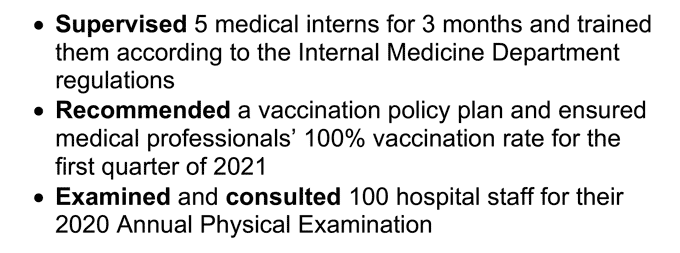
You’ll also need to make a cover letter that gives more details about your medical qualifications.
